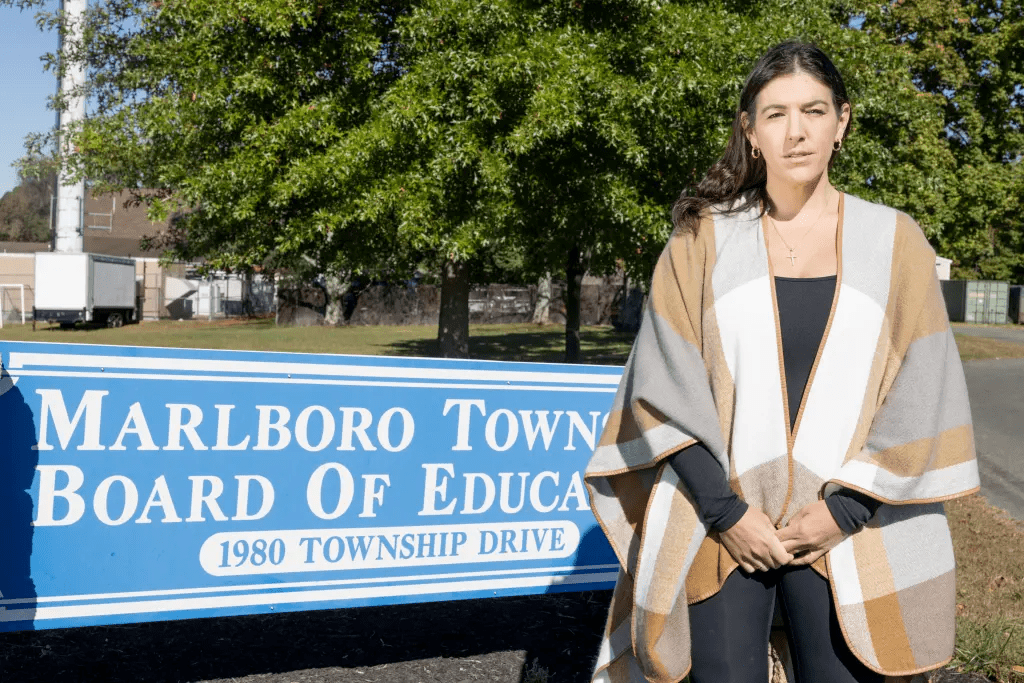New Jersey School Board Faces Mass Protests and Delays Meetings After Group Chat Texts Label MAGA Mom “ThisBitchNeedstoDie”
A storm of outrage hit the quiet suburban town of Marlboro, New Jersey, after a local school board became the center of a misogynistic texting scandal. What began as seemingly internal group chat messages quickly exploded into a national controversy when screenshots revealed school board members — or at least candidates and insiders — using vile language aimed at fellow board member Danielle Bellomo, a MAGA-supporting mother of three. The backlash forced the district to postpone its next scheduled meeting, citing concerns for safety and security.

The key messages originate from a chat group titled “ThisBitchNeedstoDie,” in which derogatory and threatening comments were posted about Bellomo. One message allegedly read: “Bellomo must be cold – her nips could cut glass right n” — a crude and dehumanizing remark reportedly typed by board candidate Scott Semaya during a meeting. Among those connected to the chat allegedly were board Vice President Chad Hyett and Mitesh Gandhi, the husband of sitting board member Aditi Gandhi. The revelations sparked a police investigation and ignited a firestorm of parent protests and calls for resignations.
Despite the severity of the messages and the public uproar, the Marlboro Board of Education voted against removing Hyett and other implicated members during a six-hour public meeting. Instead, board President Brian Cohen announced the postponement of the November 11 meeting — a move that many interpreted as avoiding accountability rather than addressing the crisis. Some parents said the decision underscored what they view as the board’s shame or fear of scrutiny, rather than commitment to transparency.

The controversy has drawn national attention. U.S. Senator Ted Cruz condemned the messages as “wrong” and “evil,” amplifying the scandal far beyond New Jersey. Parents say their children are growing unsettled by the glare of public attention and the district’s inability to quell the community’s concerns. Some believe the chats reflect a deeper issue of political hostility and lack of civility in school governance.

From the district’s perspective, safety claims were cited to justify the postponement. Marlboro Schools Superintendent Michael Ballone issued a statement emphasizing the district’s “invaluable relationship with our local police department” and said “the upcoming meeting will be no different” in terms of security. Critics, however, argue such language suggests fear of parental protest rather than a genuine security threat. Meanwhile, Bellomo, who recused herself from the controversial executive session, said that the district “did not take any action to speak out” against the individuals involved, leaving her feeling unprotected and abandoned.

For many in Marlboro, the scandal isn’t just about offensive texts. It raises broader questions about how school boards handle internal accountability, the political motivations at play in local governance, and the safety of board members who don’t align with the prevailing ideological tone. As parent after parent testified at the meeting, this wasn’t just a misstep — it felt like a breach of trust.

With investigations underway and the public pressure mounting, the Marlboro school board now faces a critical juncture. The decision to delay the meeting may temporarily quell the uproar, but it also risks being seen as a stalling tactic until the attention fades. In the end, residents are left asking whether their elected board is more interested in optics and avoidance than in restoration of trust.


